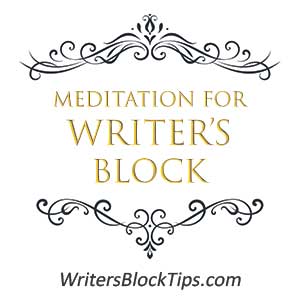Meditation for Writer’s Block – Advice for Writer’s Block
 Writer’s block is a common obstacle that many writers face. It can feel frustrating and disheartening to stare at a blank page, unable to channel your ideas or creativity into words. While the causes of writer’s block vary, one powerful and effective way to overcome it is through meditation. By calming the mind through mediation for writer’s block, you can enhance your focus. You’ll reconnect with your creative self, move past mental roadblocks, and reclaim your writing flow.
Writer’s block is a common obstacle that many writers face. It can feel frustrating and disheartening to stare at a blank page, unable to channel your ideas or creativity into words. While the causes of writer’s block vary, one powerful and effective way to overcome it is through meditation. By calming the mind through mediation for writer’s block, you can enhance your focus. You’ll reconnect with your creative self, move past mental roadblocks, and reclaim your writing flow.
This article will explore the connection between meditation and creativity, the specific benefits of meditation for writer’s block, and how integrating meditation into your routine can enhance your writing practice. Created by a former literary agent who’s helped 400+ authors get literary agents and/or traditional book publishers as an author coach/consultant, this article is part of a guide about How to Get Over Writer’s Block.
Why Meditation Works for Writer’s Block
Meditation is the practice of focusing the mind and cultivating awareness. When writer’s block strikes, it’s often accompanied by stress, self-doubt, or a cluttered mind—factors that hinder the creative process. Meditation works by addressing these underlying issues, helping you quiet the mental noise and create a space for inspiration to emerge.
Calms the Mind
One of the main causes of writer’s block is an overactive mind filled with distractions, worries, or perfectionist tendencies. Meditation trains you to observe your thoughts without judgment, creating a sense of inner calm that allows you to focus on the present moment.
Reduces Stress and Anxiety
Writer’s block can be exacerbated by the pressure to meet deadlines or produce high-quality work. Meditation has been shown to reduce cortisol levels, the stress hormone, helping you approach your writing with a clearer and more relaxed mindset.
Enhances Focus and Concentration
A wandering mind often leads to procrastination and difficulty staying engaged with your writing. Meditation strengthens your ability to focus by training your mind to return to a single point of attention, whether it’s your breath, a mantra, or a physical sensation.
Boosts Creativity
Meditation encourages a state of “open awareness,” where you become more receptive to new ideas and connections. This state allows creativity to flow naturally, making it easier to overcome blocks and generate fresh perspectives.
The Benefits of Meditation for Writers
Meditation offers specific benefits that make it a valuable tool for writers dealing with creative blocks.
- Improved Self-Awareness
Meditation encourages introspection, helping you uncover the thoughts and emotions that may be contributing to your writer’s block. By understanding these underlying factors, you can address them and move forward with greater clarity.
- Enhanced Mindfulness
Mindfulness, a key component of meditation, trains you to stay present in the moment. This practice can help you focus on the act of writing rather than getting caught up in worries about the outcome or comparing yourself to other writers.
- Increased Emotional Resilience
Writer’s block can trigger feelings of frustration, inadequacy, or even despair. Meditation fosters emotional resilience, enabling you to navigate these emotions with greater ease and return to your writing with a more balanced mindset.
- Greater Patience and Persistence
Writing is often a long and challenging process. Meditation teaches patience by reminding you that progress takes time and that each moment spent writing is valuable, regardless of the immediate results.
How to Incorporate Meditation into Your Writing Practice
Integrating meditation into your daily routine doesn’t have to be time-consuming or complicated. Here are some simple ways to make meditation a regular part of your writing practice:
- Start with Short Sessions
Begin with 5–10 minutes of meditation each day. As you become more comfortable with the practice, you can gradually increase the duration.
- Meditate Before Writing
Set aside time to meditate before you sit down to write. This helps clear your mind, reduce distractions, and create a mental space for creativity to flow.
- Use Meditation as a Reset
If you find yourself stuck or frustrated during a writing session, take a break to meditate. Even a few minutes of deep breathing or mindfulness can help you reset and approach your work with renewed focus.
- Create a Meditation Space
Designate a quiet, comfortable space for meditation where you won’t be interrupted. This can be a corner of your room, a spot in nature, or simply a chair where you feel relaxed.
Meditation Techniques for Writer’s Block
There are various meditation techniques that can help you overcome writer’s block. Experiment with these methods to find what works best for you.
- Mindfulness Meditation
Mindfulness meditation involves focusing on the present moment without judgment. To practice this technique:
- Sit comfortably and close your eyes.
- Pay attention to your breath, noticing the sensation of each inhale and exhale.
- When your mind wanders, gently bring your focus back to your breath.
This practice helps you quiet mental chatter and stay grounded, making it easier to approach your writing with clarity.
- Guided Visualization
Guided visualization meditation can spark creativity by helping you imagine scenes, characters, or storylines. You can use pre-recorded guided meditations or create your own visualization exercises. For example:
- Picture yourself walking through a magical forest.
- Notice the sights, sounds, and smells around you.
- Imagine discovering something unexpected, such as a hidden door or a mysterious figure.
Let the images that arise inspire your writing.
- Loving-Kindness Meditation
This technique involves cultivating compassion and kindness toward yourself and others. It’s particularly helpful for overcoming self-doubt and critical inner voices. To practice:
- Sit comfortably and repeat phrases such as “May I be happy, may I be healthy, may I be at peace.”
- Extend these wishes to others, including your readers or characters.
By fostering a sense of goodwill, loving-kindness meditation can help you approach your writing with a more open and positive mindset.
- Body Scan Meditation
A body scan meditation helps you connect with your physical sensations, releasing tension and promoting relaxation. To practice:
- Lie down or sit comfortably.
- Focus on each part of your body, starting from your toes and moving up to your head.
- Notice any areas of tension and consciously relax them.
This technique can help you release physical and mental stress, making it easier to focus on your writing.
- Creative Flow Meditation
This meditation is designed to tap into your creative energy. To practice:
- Close your eyes and take a few deep breaths.
- Visualize a stream of light or energy flowing through your mind, representing creativity.
- Imagine this stream washing away doubts and blockages, leaving you open to new ideas.
Afterward, begin writing without judgment, allowing the flow of creativity to guide you.
Success Stories: Writers and Meditation
Many successful writers have credited meditation with helping them overcome creative blocks and maintain their productivity.
David Lynch
The renowned filmmaker and author is an advocate for Transcendental Meditation (TM). He has described how meditation helps him access deeper levels of creativity and find inspiration for his projects.
Elizabeth Gilbert
Author of Eat, Pray, Love, Gilbert practices meditation to manage the emotional challenges of the creative process. She has spoken about how meditation helps her stay focused and connected to her work.
George Saunders
The Booker Prize-winning author of Lincoln in the Bardo has incorporated mindfulness practices into his writing routine. Saunders credits meditation with helping him quiet his inner critic and explore his ideas with greater freedom.
The Long-Term Benefits of Meditation for Writers
While meditation can provide immediate relief from writer’s block, its long-term benefits are even more profound. With regular practice, meditation can:
- Strengthen Focus: Over time, meditation enhances your ability to concentrate for extended periods, improving the quality of your writing.
- Foster Resilience: Meditation helps you develop a healthier relationship with setbacks, making it easier to navigate creative challenges.
- Enhance Creativity: By cultivating open awareness, meditation allows you to access deeper layers of imagination and originality.
- Promote Well-Being: A calm and balanced mind leads to greater overall satisfaction, helping you enjoy the writing process rather than viewing it as a source of stress.
Conclusion – Meditation for Writer’s Block
Meditation for writer’s block is a powerful tool that offers both immediate and lasting benefits. By calming the mind, reducing stress, and fostering creativity, meditation can help you overcome mental roadblocks and reconnect with your passion for writing.
Whether you choose mindfulness, guided visualization, or another meditation technique, the key is to approach the practice with consistency and openness. Over time, meditation will not only help you navigate writer’s block but also enhance your overall creative process, allowing you to write with greater clarity, focus, and joy.
Embrace meditation as a part of your writing journey, and watch as it transforms both your mindset and your craft. The blank page is no longer something to fear—it’s an opportunity waiting to be filled with your unique voice and vision.
Now that you’ve read “Meditation for Writer’s Block,” click here to read “Inspiration for Writer’s Block.”

 This guide about
This guide about 